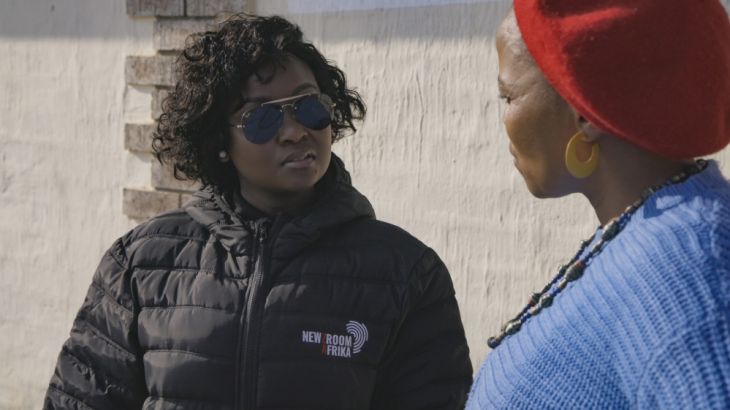
South Africa’s Deadly Politics
A journalist known for exposing political violence in South Africa reports on the unsolved murder of a local politician.
Ziyanda Ngcobo is a young, ambitious journalist known for reporting on the scourge of political violence in KwaZulu-Natal, South Africa.
The province has seen more than 500 political assassinations since the country’s first democractic elections in 1994, as politicians fall prey to a deadly scramble for state resources and contracts.
Keep reading
list of 4 items‘I am prepared to die’: Mandela’s speech which shook apartheid
‘Prejudice, Islamophobia’: Free speech fears as UK redefines extremism
Fears of discrimination in Thailand despite looming same sex marriage bill
Ziyanda is now investigating the murder of Sindiso Magaqa, a popular local politician and member of the ruling ANC party known for his anti-corruption work. He was fatally shot in July 2017.
As the murder trial plays out across the nation’s TV screens, Ziyanda revisits the scene of the crime looking for answers. She also speaks to a politician who has become a whistle-blower against corruption and is a key witness to the murder.
Her investigation takes her to the Glebelands hostel complex, where the murder rate is four times the national average and a high unemployment rate means residents are more vulnerable to being hired as hitmen.
Many of those who witnessed these killings, or whose loved ones were lost, face threats of their own and still live in fear.
Ziyanda is determined to continue reporting despite the dangers, working all hours of the day to get the story out.
South Africa’s Deadly Politics follows Ziyanda as she pushes issues of political violence into the national spotlight, determined to expose what she sees as an absolute threat to post-apartheid South Africa and its democracy.
FILMMAKERS’ VIEW
By Christopher Clark and Shaun Swingler
In early 2018, we made the first of what would become many trips to the South African province of KwaZulu-Natal to report on an uptick in political killings in a place with a long history of political violence.
To a large degree, our initial motivation stemmed from a sense that the issue had been grossly underreported both in local and international media. The same could be said of KwaZulu-Natal more generally, despite it being South Africa’s second-most populous province, an important contemporary stronghold of the ruling African National Congress (ANC), and formerly a key site of contention during the bloody final throes of apartheid.
With South Africa due to head to the polls in May 2019, it seemed to us that political killings in KwaZulu-Natal could pose a significant threat to the country’s young democracy, while also highlighting the rampant corruption that has beset the ANC in recent years.
Ziyanda Ngcobo, an ambitious young local journalist and the main character of our film, proved to be an invaluable source in our initial forays into the province, both as a rare exception in terms of her consistent, brave and meticulous coverage of political violence, and in her willingness to share information, leads and contacts.
From the outset, we were struck by the considerable risks that Ziyanda had confronted both as a journalist and as a woman in this frequently violent part of the country. Her unwavering determination and the seemingly unparalleled access it had helped her secure were equally striking.
Ziyanda quickly emerged as a compelling vehicle through which to map KwaZulu-Natal’s complex political landscape and to join some of the dots between its disparate flashpoints and its victims of political assassination. She also embodied the vital role of the media in holding power to account in such contexts.
In 2019, we spent several weeks shadowing Ziyanda for this film as she traversed this picturesque but deeply troubled province and, in particular, revisited the high-profile case of Sindiso Magaqa.
Ziyanda felt that Magaqa’s death had marked a turning point in terms of South Africans’ awareness of the extent of political violence in KwaZulu-Natal. “I think the assassination of Sindiso Magaqa is what really made people say ‘what the hell is going on there?'” she said. “But it’s not one person. There’s a much larger context to it. It’s about the deterioration of the moral fibre of society as well.”
Ziyanda’s ongoing investigations into Magaqa’s case throughout this film help to introduce several subsidiary characters that have also been touched by the tendrils of political violence, from one of Magaqa’s former colleagues and friends to an outspoken activist in a poor and partisan hostel complex that has become known as a “reservoir of hitmen”.
Through these characters, the film gives a poignant sense of the elusiveness of justice for political killings in KwaZulu-Natal and shows the considerable emotional toll this lack of resolution has begun to take on Ziyanda.
In doing so, it more broadly reflects the continuing effect of apartheid’s violent legacy on South Africa’s uncertain present. But it also proffers hope in Ziyanda’s incessant need to bear witness and her refusal to give up despite the obstacles. As she says at the close of the film: “You can’t start a story like Sindiso Magaqa and then lose steam halfway.”